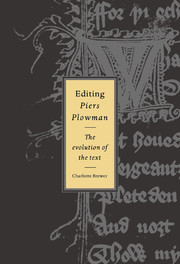Book contents
- Frontmatter
- Contents
- Acknowledgements
- Abbreviations
- Note on the texts
- Introduction
- Part I The early phase
- 1 Crowley
- 2 Percy, Warton, Tyrwhitt, Ritson
- 3 Whitaker and Price
- 4 Wright
- Part II The late nineteenth century
- Part III The Skeat aftermath
- Part IV Chambers and Grattan, Knott and Fowler
- Part V The Athlone Press edition
- Part VI Epilogue: the Athlone aftermath: Schmidt, Pearsall, Rigg-Brewer, et al.
- Works cited
- General index
- Index of manuscripts
- CAMBRIDGE STUDIES IN MEDIEVAL LITERATURE
2 - Percy, Warton, Tyrwhitt, Ritson
Published online by Cambridge University Press: 20 August 2009
- Frontmatter
- Contents
- Acknowledgements
- Abbreviations
- Note on the texts
- Introduction
- Part I The early phase
- 1 Crowley
- 2 Percy, Warton, Tyrwhitt, Ritson
- 3 Whitaker and Price
- 4 Wright
- Part II The late nineteenth century
- Part III The Skeat aftermath
- Part IV Chambers and Grattan, Knott and Fowler
- Part V The Athlone Press edition
- Part VI Epilogue: the Athlone aftermath: Schmidt, Pearsall, Rigg-Brewer, et al.
- Works cited
- General index
- Index of manuscripts
- CAMBRIDGE STUDIES IN MEDIEVAL LITERATURE
Summary
Crowley's edition was inaccurately reprinted by one Owen Rogers in 1561, which indicates that the success of the previous printing still promised a financial reward eleven years later. Rogers based his text on Crowley's third edition, and he rearranged the prefatory material, prefixing the appropriate portion of Crowley's summary of the poem before each individual passus. He also appended a copy of Pierce the Ploughman's Crede, presumably in the mistaken belief that both poems were by the same author. But Piers Plowman then languished unprinted for over two hundred years. It was not that the poem went completely unnoticed, or even unread. Michael Drayton paraphrased some of the final vision in his Legend of Thomas Cromwell (1607); Milton refers to the ‘vision and Creed of Pierce Plowman’ and possibly drew on some of its material in Paradise Lost (1667); while Dryden in 1700 evidently knew enough of the poem to be able to confuse it with the apocryphal Plowman's Tale. A selection of extracts from the poem survives in a seventeenth-century collection made by Richard James, the antiquary and librarian to Sir Robert Bruce Cotton. The more famous antiquary, Thomas Hearne, who had seen at least two manuscripts of the poem, and owned at least one copy of Roger's edition and two copies of Crowley's, wrote on the flyleaves of both of the latter some interesting and perceptive speculations on the poem's author and date, suggesting there and elsewhere that the poem had been revised both by the author and by an additional person (1724 and 1725).
- Type
- Chapter
- Information
- Editing Piers PlowmanThe Evolution of the Text, pp. 20 - 36Publisher: Cambridge University PressPrint publication year: 1996



